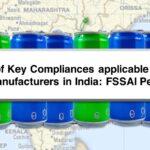Beer is the world’s most widely consumed alcoholic drink, and is the third-most popular drink overall, after water and tea. The Indian Beer Market has a presence of more than 140 Beer brands catering to the palate of varied customer segments. This is the sole reason why most of the major Beer Manufacturing companies around the world have now created a base in India either by setting up manufacturing units or enhancing their distribution chains. The latest being Dutch brewer Heineken buying 39.6 million shares in United Breweries Limited.
The interest level of brands and companies is though a positive news for the economy, yet it is very hard to overlook that it is a highly regulated industry and the regulatory compliance requirements around the industry is often very complex. Alcohol is a subject in the State List under the Seventh Schedule of the Constitution of India and each state thus has their own set of laws and rules governing the production, storage, transport, sale and consumption. This blog will help readers to identify the significant compliances for manufacturing, bottling, labelling, storage of Beer across four states i.e., Karnataka, Haryana, Telangana, and Rajasthan.

Karnataka:
Law Name: KARNATAKA EXCISE ACT, 1965; KARNATAKA EXCISE (BREWERY) RULES, 1967
Application in Form 1 has to be made to the Commissioner through Deputy Commissioner with the following documents to be annexed with the application:
- A treasury challan for having credited the prescribed fee.
- Full description of the premises or the plan of the proposed building.
- An additional license fee equivalent to 15% of the prescribed fee is levied for the purpose of various infrastructure projects across the State.
- License is granted under Form 2, and it remains valid for a period of 1 year from the date of issue.
Andhra Pradesh
Law Name: ANDHRA PRADESH EXCISE ACT, 1968 (AS APPLICABLE TO TELANGANA); THE ANDHRA PRADESH BREWERY RULES, 2006 (AS APPLICABLE TO TELANGANA).
An application for grant of letter of intent has to be made along with the following:
- Payment of prescribed fee to the government treasury after grant of
- A special prescribed fee as per the production capacity which can be adjusted with the future license fee.
Upon grant of the letter of intent, within six months another application has to be made along with the following
- A deposit of further prescribed fee as security within six months of grant of letter of intent.
- The payment of the prescribed license fee.
The licence fee shall remain same and payable annually till the beginning of production or the completion of construction which shall be withing two and a half years of grant of letter of intent. The Applicant shall be granted a licence in Form – B2.
Haryana
Law Name: PUNJAB EXCISE ACT, 1914 (AS APPLICABLE TO HARYANA); PUNJAB BREWERY RULES, 1956(AS APPLICABLE TO HARYANA).
An application has to be made to the Excise commissioner with the following requisites are to be fulfilled along with the application:
- The deposit of prescribed license fee.
- Payment of prescribed security deposit
- A full description of the premises or plan of proposed premises and utensils plant.
The Applicant shall be granted a license by the Commissioner in Form – B1.
Rajasthan
Law Name: RAJASTHAN EXCISE ACT, 1950; RAJASTHAN EXCISE RULES, 1956.
A. An application for grant of license for permission to set up brewery / bottling plant in Rajasthan shall be made in form B.W.H. 1 along with the following:
- Site plan
- Proposed production capacity.
- Details of process of manufacture.
- NOC from Rajasthan Pollution Control Board.
- Certificate about suitability of water to be used.
- Undertaking to manufacture alcohol / liquor as per specifications prescribed by the Bureau of Indian Standards.
- Undertaking to pay excise duty on wastage in excess of prescribed limits.
- Undertaking to pay licence fees, security and other levies on demand by the department.
- Affidavit to the effect that (i) applicant is not in arrears of excise revenue, (ii) no criminal case is pending against him, and (iii) he is not ineligible to hold the licence applied for.
B. Applicable only if Project is proposed to be set up on land other than RIICO (Rajasthan Industrial Development & Investment Corporation Limited).
- NOC from District Magistrate.
- NOC from the concerned electricity supply corporation with regard to supply of electricity.

Karnataka
Law Name: KARNATAKA EXCISE ACT, 1965; KARNATAKA EXCISE (BREWERY) RULES, 1967.
Every License granted under the rules will only be valid for a year. An application for renewal has to be made at least one month prior to the date of expiry of the existing license. The application will have to be accompanied by a treasury challan for having paid the fee prescribed for renewal.
Andhra Pradesh
Law Name: ANDHRA PRADESH EXCISE ACT, 1968 (AS APPLICABLE TO TELANGANA); ANDHRA PRADESH BREWERY RULES, 2006 (AS APPLICABLE TO TELANGANA).
Every license granted will only be for a year and will have to be renewed timely. Every licensee shall renew the license every year before the expiry of the previous license by making payment of the prescribed fee.
Haryana
Law Name: THE PUNJAB EXCISE ACT, 1914 (AS APPLICABLE TO HARYANA); PUNJAB BREWERY RULES, 1956 (AS APPLICABLE TO HARYANA).
Every License granted will only be for a year and timely renewal has to be made. An application for renewal has to be made by a brewery and it shall be at least two months prior to the date of expiry of the existing license. The payment of prescribed fee shall also be made along with the application.
Rajasthan
Law Name: RAJASTHAN EXCISE ACT, 1950; RAJASTHAN BREWERY RULES, 1972.
Every License granted will only be for a year and has to be renewed. The renewal can be done by the brewery by making an application in Form R.B. 1(B) to the Excise Commissioner through the District Excise Officer for renewal of brewery license on or before 28th of February every year. If there has been alteration in either plant or building, fresh application must be submitted. If there has been no alteration, a certificate to this effect from the officer in charge should be attached with the application for renewal of the license. Any license if unrenewed shall remain null and void.

Karnataka
Law Name: KARNATAKA EXCISE ACT, 1965; KARNATAKA EXCISE (BOTTLING OF LIQUOR) RULES, 1967.
- The licensee among other conditions shall maintain the following while bottling:
- The bottling has to be done only on the licensed premises.
- While bottling the Beer cannot be diluted of strengthened beyond the limits permitted to the licensee.
- The bottling has to be carried out only in the presence of a Warehouse Officer or such other officer.
- A six hours’ notice of the intention of bottling should be given to the Warehouse Officer.
- Smoking or naked lights or fire are not allowed within the premises where bottling is being carried out.
Andhra Pradesh
Law Name: ANDHRA PRADESH EXCISE ACT, 1968 (AS APPLICABLE TO TELANGANA); THE ANDHRA PRADESH BREWERY RULES, 2006 (AS APPLICABLE TO TELANGANA).
The licensee among other things shall maintain while bottling:
- Bottling shall be done in specified rooms termed as bottling rooms within the premises of the brewery.
- The bottling rooms and the bottled Beer storerooms shall be secured in such manner as the Commissioner may approve.
- Beer shall be bottled at the strength specified by the Commissioner from time to time.
- Sample from each batch shall be sent to the Chemical Examiner and it shall be passed by the Chemical Examiner.
- Bottling shall be done during the ordinary working hours of the Brewery.
Haryana
Law Name: THE PUNJAB EXCISE ACT, 1914 (AS APPLICABLE TO HARYANA); PUNJAB BREWERY RULES, 1956 (AS APPLICABLE TO HARYANA).
The licensee among other things shall ensure while bottling that:
- The bottling is carried out within the premises of the brewery
- The licensee has given timely information to the Excise Inspector of days and hours during which bottling is to be done.
- Bottling will be allowed only during working hours from 10 a.m. to 5 p.m.
- If the licensee has reduced the strength of spirit by dilution, he shall not bottle the spirit until 12 hours after reduction, unless arrangements approval by the Financial Commissioner have been made to cool the spirit and to prevent shrinkage after bottling.
- Beer shall be bottled of any colour or description having a capacity of 650 milliliters and 325 milliliters.
- The bottles shall have necks suitable for sealing with crown corks [or in two-piece aluminum cans of such capacity as may be approved by Excise Commissioner].
Rajasthan
Law Name: RAJASTHAN EXCISE ACT, 1950; RAJASTHAN BREWERY RULES, 1972.
The licensee among other things shall maintain while bottling:
- No liquor except Beer shall be produced in the premises.
- The whole of the product of brewing shall be collected within eighteen hours.
- The brewer shall not dilute, alternate or add anything except Beer finings or other sanctioned matters.

Karnataka
Law Name: KARNATAKA EXCISE ACT, 1965; KARNATAKA EXCISE (BOTTLING OF LIQUOR) RULES, 1967.
The licensee has to pay the prescribed fee for approval or renewal of label of each brand of Beer which is bottled within the state. The labels which are approved or renewed will be valid till 30th of June each year.
The label of the Beer among other things shall contain:
- The brand and description of the Beer with strength
- Place of manufacture
- The fact that he is compounding or blending if any was done in India
- Place of bottling
- Full name of the licensee
- Full name of the manufacturer
- The quantity of Beer bottled.
Andhra Pradesh
Law Name: ANDHRA PRADESH EXCISE ACT, 1968 (AS APPLICABLE TO TELANGANA); THE ANDHRA PRADESH BREWERY RULES, 2006 (AS APPLICABLE TO TELANGANA).
An application for approval of label shall be made to the commissioner. An approved label among other things shall contain:
- Name and Address of the Manufacturer.
- Batch Number, Month and Year of Manufacture.
- Net contents.
- Strength.
- Kind of Beer.
- Maximum Retail Price.
- Details of manufacturing under sub-lease/Tie-up/Franchisee (If any).
- Inscription “Consumption of Beer is injurious to health”.
- The Maximum Retail Price on the label shall be prominently depicted on a separate band on the top of the label.
Haryana
Law Name: THE PUNJAB EXCISE ACT, 1914 (AS APPLICABLE TO HARYANA); HARYANA EXCISE POLICY 2018-2019.
The Label among other things shall have the following requisites:
- It shall have name of the licensed bottler and the place of bottling.
- It shall not be an imitation of any other label.
- It shall not be of objectionable nature.
- It shall be easily distinguishable.
- It should not be pasted over any words, letters or monograms molded.
Rajasthan
Law Name: RAJASTHAN EXCISE ACT, 1950; RAJASTHAN EXCISE RULES, 1956.
Every manufacturer should make an application to the Excise Commissioner along with the payment of prescribed fee to approve the labels according to each packing size (i.e., quart, pint, nip or any other size, as the case may be) of the brands intended to be manufactured or sold in Rajasthan.

Karnataka
Law Name: KARNATAKA EXCISE ACT, 1965; KARNATAKA EXCISE (BOTTLING OF LIQUOR) RULES, 1967
General Conditions for Storage of Beer:
- The Warehouse needs to be equipped with separate rooms or compartments and is required to be provided for:
- Storage of Beer in bulk; and
- Storage of Beer in sealed bottles.
- The licensee is required to store the Beer in cask or containers serially marked with their capacities.
Where Beer is stored in casks which are used exclusively for storing and not for an issue from the brewery, such casks are required to be numbered consecutively and each are required to have mark on both heads, its number and capacity which should be entered in the register kept by the brewer in the form prescribed by the Commissioner and also the number of brews in which the Beer was manufactured.
Andhra Pradesh
Law Name: ANDHRA PRADESH EXCISE ACT, 1968 (AS APPLICABLE TO TELANGANA); THE ANDHRA PRADESH BREWERY RULES, 2006 (AS APPLICABLE TO TELANGANA).
General conditions for storage of Beer:
The structure of the brewery should be permanent and provide sufficient space for equipment and material storage so that the work can be carried out in a hygienic manner.
- No portion of the brewery shall be used for domestic purposes or for preparation of food.
- All equipment shall be cleaned regularly to prevent contamination.
- Proper care should be taken to cover the vats and vessels.
- Tanks in the brew room shall be of stainless steel and shall be maintained in such a way to prevent corrosion.
Haryana
Law Name: THE PUNJAB EXCISE ACT, 1914 (AS APPLICABLE TO HARYANA); PUNJAB BREWERY RULES, 1956 (AS APPLICABLE TO HARYANA).
General Conditions for storage of Beer:
- The total produce or brewing shall be kept separate with the produce of any other brewing.
- The licensee shall not mix the produce of one brewing with hat of another except in his store vats or casks, unless he has given previous notice in writing to the Inspector.
Rajasthan
Law Name: RAJASTHAN EXCISE ACT, 1950; RAJASTHAN BREWERY RULES, 1972.
General conditions for storage of Beer:
- Distinguishing marks to be painted on each vessel.
- If one or more vessels are used for the same purpose, then they shall be numbered progressively.
- Vessels shall be placed in such a way so that the contents can be gauged accurately.
As one can conclude from above, the regulatory landscape around the Beer industry is very dynamic and varied. Obtaining and maintaining proper permits and licenses becomes the key to smooth operations of business. However, it is a common observation that such is not possible without regular statutory audits which helps to identify potential gaps and analyze penalties associated to mitigate compliance risk within the organization. Keeping abreast of the changes and latest developments in the State Excise Rules can prove to be a game changer. Investing in a proper compliance management solution is an easy yet effective mechanism to meet all the objectives. Given the potential for growth and the amount of risk involved it seems that is not that heavy a price to pay.
Written by: Amala Halder
Edited by: Soham Chaudhury, Saikat Mondal
Disclaimer
All material included in this blog is for informational purposes only and does not purport to be or constitute legal or other advice. This blog should not be used as a substitute for specific legal advice. Professional legal advice should be obtained before taking or refraining from an action as a result of the contents of this blog. We exclude any liability (including without limitation that for negligence or for any damages of any kind) for the content of this blog. The views and opinions expressed in this blog are those of the author/(s) alone and do not necessarily reflect the official position of Lexplosion Solutions. We make no representations, warranties or undertakings about any of the information, content or materials provided in this blog (including, without limitation, any as to quality, accuracy, completeness or reliability). All the contents of this blog, including the design, text, graphics, their selection and arrangement are the intellectual property of Lexplosion Solutions Private Limited and/or its licensors.
ALL RIGHTS RESERVED, and all moral rights are asserted and reserved.





